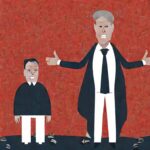An economic agent is a representation of people or entities in an economic model. They can be households, firms, or governments and engage in economic activities such as buying, selling, and producing goods and services. Economic agents are different from people because they can be controlled within certain assumptions and constraints, making them a useful tool for simplifying economic models.
Types of economic agents
Different types of economic agents are typically involved in different types of actions and decisions. Households may decide how much to save or borrow, what goods and services to consume, and how much to work. Firms may decide how much to produce, what prices to set, and what inputs to use. Finally, governments may decide how much to tax and spend, what regulations to implement, and how to manage the money supply.
Limitations
The concept of economic agents as rational, self-interested individuals making logical decisions based on maximizing their own utility has long been a fundamental assumption in traditional economic theory. However, this assumption has been challenged by the field of behavioural economics, which recognizes that human decision-making is often influenced by a range of psychological and social factors.
One criticism of the concept of economic agents is that it fails to consider the influence of emotions on decision-making. Traditional economic theory assumes that individuals make decisions based on a rational calculation of their own interests, but behavioural economics research has shown that emotions such as fear, anger, and greed can play a significant role in shaping decision-making. For example, individuals may make decisions based on a fear of losing out or a desire to keep up with others, rather than a rational calculation of their own interests. This means that the concept of economic agents as rational, self-interested individuals may be overly simplistic and does not accurately reflect the complex nature of human decision-making.
Another criticism of the concept of economic agents is that it ignores the influence of social and cultural factors on decision-making. Traditional economic theory assumes that individuals make decisions based on their own individual preferences and needs, but behavioural economics research has shown that social and cultural factors can have a significant impact on decision-making. For example, individuals may be influenced by the opinions and behaviour of others, such as their family, friends, or social media networks. This means that the concept of economic agents as isolated, individual decision-makers may be unrealistic and does not capture the complex social and cultural influences on human behaviour.
Furthermore, the concept of economic agents as rational, self-interested individuals may also be problematic in terms of ethics and social justice. Traditional economic theory assumes that individuals make decisions based on maximizing their own utility, but this assumption may lead to a lack of concern for the welfare of others or the impact of decisions on society as a whole. For example, individuals may make decisions that benefit themselves at the expense of others, or they may engage in behaviour that is harmful to the environment or public health. This means that the concept of economic agents as rational, self-interested individuals may not be ethically desirable or socially responsible.
Despite these limitations, the concept of economic agents remains a valuable tool for simplifying complex models. By making assumptions about the behaviour and decision-making of economic agents, economists can gain insight into the workings of markets and the economy as a whole. However, it is important to recognize the limitations of this approach and to use it in conjunction with other methods to better understand the complexities of real-world economic phenomena.
Author Profile

- Luke Watson has a BSc (Hons) in international business and economics. He is currently working as an IBDP economics teacher at Shanghai United International School in China.
Latest entries
- March 10, 2023CourseHow the Fed Sets Interest Rates Post-Crisis
- February 5, 2023CourseHow to Calculate the Gini Coefficient Using the Lorenz Curve
- January 29, 2023CourseHow to Score Full Marks on the Economics IA
- January 29, 2023CourseHow to Effectively Structure Your Economics IA





Comments are closed